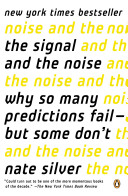All Models are Wrong, but some models are useful
As the statistician George E. P. Box wrote, “All models are wrong, but some models are useful.”90 What he meant by that is that all models are simplifications of the universe, as they must necessarily be. As another mathematician said, “The best model of a cat is a cat.”91 Everything else is leaving out some sort of detail. How pertinent that detail might be will depend on exactly what problem we’re trying to solve and on how precise an answer we require.
Nor are statistical models the only tools we use that require us to make approximations about the universe. Language, for instance, is a type of model, an approximation that we use to communicate with one another. All languages contain words that have no direct cognate in other languages, even though they are both trying to explain the same universe. Technical subfields have their own specialized language. To you or me, the color on the front cover of this book is yellow. To a graphic designer, that term is too approximate—instead, it’s Pantone 107.
[...]
A good model can be useful even when it fails. “It should be a given that whatever forecast we make on average will be wrong,” Ozonoff told me. “So usually it’s about understanding how it’s wrong, and what to do when it’s wrong, and minimizing the cost to us when it’s wrong.”
The key is in remembering that a model is a tool to help us understand the complexities of the universe, and never a substitute for the universe itself. This is important not just when we make predictions. Some neuroscientists, like MIT’s Tomasso Poggio, think of the entire way our brains process information as being through a series of approximations.
This is why it is so crucial to develop a better understanding of ourselves, and the way we distort and interpret the signals we receive, if we want to make better predictions.
Notes:
All models are simplifications of the universe, this includes language as a form of modeling.
Folksonomies: predictions models simulation
Taxonomies:
/hobbies and interests/astrology (0.417469)
/art and entertainment/visual art and design/design (0.410176)
/science (0.403819)
Keywords:
statistician George E. (0.987601 (neutral:0.000000)), brains process information (0.860100 (positive:0.333335)), models (0.705494 (negative:-0.362102)), universe (0.691522 (positive:0.444446)), Tomasso Poggio (0.663927 (neutral:0.000000)), P. Box (0.660987 (neutral:0.000000)), exactly what problem (0.655159 (positive:0.835107)), Technical subfields (0.645314 (neutral:0.000000)), direct cognate (0.644839 (neutral:0.000000)), statistical models (0.624892 (negative:-0.228360)), best model (0.623274 (positive:0.291415)), graphic designer (0.614478 (neutral:0.000000)), good model (0.609376 (negative:-0.622026)), specialized language (0.606011 (neutral:0.000000)), better predictions (0.590952 (neutral:0.000000)), entire way (0.585804 (positive:0.333335)), better understanding (0.575301 (positive:0.578481)), simplifications (0.558658 (neutral:0.000000)), approximations (0.484707 (positive:0.104974)), languages (0.401941 (neutral:0.000000)), neuroscientists (0.378967 (neutral:0.000000)), Pantone (0.377509 (neutral:0.000000)), instance (0.373643 (neutral:0.000000)), approximation (0.369257 (positive:0.374146)), complexities (0.369234 (positive:0.672806)), sort (0.367319 (negative:-0.258677)), substitute (0.366630 (neutral:0.000000)), mathematician (0.365022 (neutral:0.000000)), modeling (0.364605 (positive:0.275251)), useful. (0.363878 (neutral:0.000000))
Entities:
Tomasso Poggio:City (0.678337 (neutral:0.000000)), George E. P. Box:Person (0.657862 (neutral:0.000000)), Ozonoff:Person (0.601698 (negative:-0.449346)), MIT:Organization (0.545557 (neutral:0.000000))
Concepts:
Universe (0.989426): dbpedia | freebase
Linguistics (0.979260): dbpedia | freebase | opencyc
Model (0.773393): dbpedia | opencyc
Standard Model (0.728526): dbpedia | freebase | yago
Understanding (0.677513): dbpedia | freebase | opencyc
Translation (0.676935): dbpedia | freebase | opencyc
Language (0.605629): dbpedia | freebase | opencyc
Quark (0.604430): dbpedia | freebase






